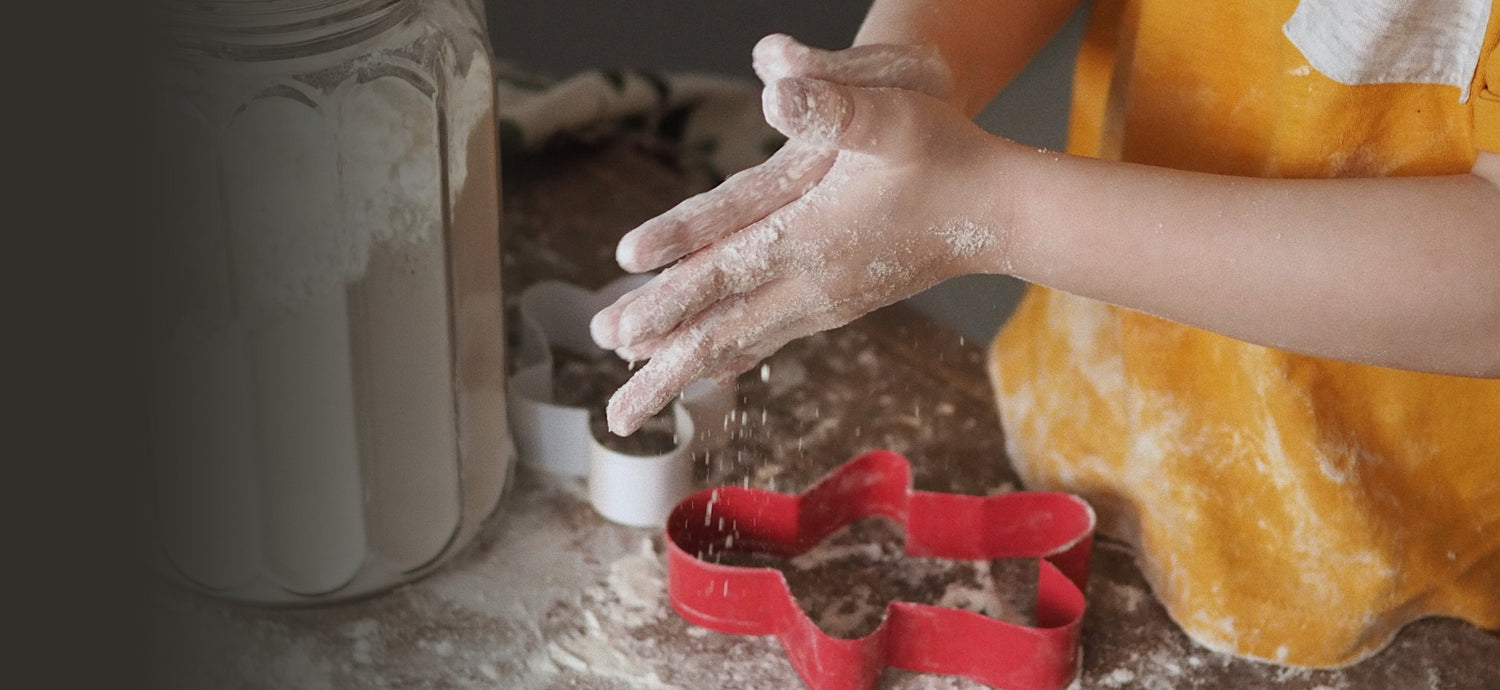Cooking with Children – Part 1
by Shannon Pead
Let’s lick the spoon!
At a time when childhood obesity rates are higher than ever and food related illnesses have reached almost epidemic proportions globally, any weapon in the arsenal to tackle diet based problems must be embraced. Recent studies have shown that children that cook at home are more likely to have positive, healthy food experiences, allowing them to make better food choices throughout their lives. It’s not just about health though; cooking with children subjects them to all manner of subliminal learning experiences, allowing them to learn without even realising they’re being taught. A win win in anyone’s book!! Time to don that apron then, and get them started as soon as they can hold that mixing spoon!
As humans we are inherently wired to remember food based experiences. The tongue, the nose, the eyes are all sensory organs designed to maximise energetic input; all designed to lead us to food! Eating itself is inherently rewarding, and as cooking leads to eating it contains a powerful inbuilt reward system. Most of us would be hard pressed to remember the people that celebrated with us on our tenth birthday, yet we can remember the cake we had, the way it looked on the table, and the joy we took in choosing it. Food is integral to our social structure; we holiday around the table, we mark occasions with cakes or roast dinners or meals out in beautiful restaurants, the price tag often reflecting the importance we place on nourishing both our bodies and our souls. And yet, nothing is more special than the food based memories we have from home! We all have favourite childhood smells; even now the smell of toast evokes mornings climbing down the stairs sleepy eyed to greet my father at breakfast; the bubbling sound of porridge on the stove reminds me of my mother, while flicking through a cook book passing the pages of beautifully photographed pancakes brings back the sheer joy of a weekend morning around the table with a giant stack of those stodgy creations and a myriad of potential toppings; food was time spent with my family, socialising, bonding, memory making…food for the eyes, the body and the soul!
15 great reasons for coaxing your children into the kitchen…
1) SCIENCE
When children cook they can explore first-hand the actions of yeast in breads, they notice the effects of oven temperatures in the rising of a soufflé, they observe fermentation processes in the making of yogurt or sauerkraut or experience the changing state of ingredients that are whipped versus mixed. The best cooks I know are chemists, the reason being that cooking IS science. So throw away that store-bought slime that ends up stuck in the carpet and pull out a bread recipe that they can knead and plait instead! … And they can even eat it when it’s done!
2) MATHS
Put away those mental arithmetic books and let your children explore concepts such as budgeting, fractions, alternative measuring methods, weights, volumes, temperatures and time with their own hands. They’ll be dividing and multiplying with the best of them in no time as they use real world examples to understand the importance of their most dreaded subject!
3) READING
Through cooking children explore language first-hand. Reading recipes, following instructions and building vocabulary are all ways in which children can put language into practise through cooking.
4) ART & CREATIVITY
From an action as simple as decorating a biscuit with their choice of coloured icing to choosing which meal to make for a beloved visitor, children learn that food can be an expressive medium, and self-expression is key to building self-esteem. Through trying, failing and succeeding children explore important life lessons in relative safety; they can take pride in their work and ultimately build the emotional resilience that will follow them into adulthood. So no more cries of ‘don’t play with your food’…at least not in the kitchen!
5) DEXTERITY
Through simple cooking techniques such as grating, whisking, rolling, plaiting and cutting your little ones will be practising and honing their fine motor skills. Improving hand-eye coordination helps both their brains and their bodies develop!
6) EMOTIONAL DEVELOPMENT
It’s interesting that a bunch of grapes remains the age-old gift for that hospitalised friend, while the obvious thing to take next door to a sick neighbour is chicken soup. Food endures as one of our social tools for showing love and compassion. Through cooking our children can choose ingredients for the sick and explore concepts of disabilities by learning about alternative ingredients. Most children at school these days know about peanut or gluten allergies through a classmate; by choosing ingredients carefully they can learn ways to include them with food, leading to increased compassion and social acceptance, which ultimately leads to a better societal make-up. Through cooking we can build our social futures, and really embrace the notion that “Food is love”!
7) CULTURAL DIVERSITY
Through cooking children can explore the origins of their food and the concepts of cultural diversity, religion and history. We have probably all heard the war time anecdotes of children encountering bananas for the first time and were incredulous at the thought of them eating them whole, peel and all! Something we might laugh at now, but even today many inner city children believe food ‘comes from’ the supermarket, from packets. Without experiencing the plants as they grow or seeing leaves still attached to their tomatoes children are unable to form links to concepts such as farming and food production. When we cook with our children they notice differences in the shapes of fruits and vegetables, they wash away dirt and ultimately understand that food doesn’t just come from a packet, which is one of the most important tools we have in fighting the junk food revolution. They learn about seasonality as different fruits and vegetables come to harvest. Through sampling flavours from different countries children explore whole other cultures! Through food holidays they learn about other religions and histories, while visits to ethnic food markets can spark off imagination and creativity. Ultimately our children learn cultural acceptance, which is ever important as our societies and schools become more culturally diverse.
8) UNDERSTANDING HEALTHY CHOICES
Any food produced at home from whole ingredients is inherently lower in calories and junk ingredients than its store bought counterpart; home cooked food therefore has an inherently increased nutritional content allowing us to truly nourish our families’ bodies. By involving our children with food preparation we can talk to them about the foods we eat and ways that we can eat them, introducing them to fresh and healthy ingredients. Kids are far more likely to try what they have themselves cooked which means that cooking can become a powerful tool for dealing with your fussy eaters. You can explore sugar substitutes in this way, allowing children to see that dates can be just as sweet in a cake as the more conventional bag of white sugar. Great foods to throw into the mix include sushi and fresh vegetables, food stuffs which can seem daunting to children when they arrive on a plate in front of them, but that they can really connect to when they get to “play” with whilst producing them. And there’s nothing more adorable than watching your little one play with a sushi rolling mat! The memories will last you and your snapchat friends a lifetime!
9) FAMILY BONDING
Did you know that children are more likely to talk about deeper concerns such as bullying when distracted by tactile pursuits? Cooking is one such activity, and provides a great platform to connect with our children, learning about their successes and failures, thoughts and feelings. Time spent in the kitchen with our children is quality time, family time. We can involve other generations and ultimately teach respect for elders’ knowledge as our children learn from grandma or grandpa, and share family recipes and secrets, leading to bonding and feelings of belonging and connection, thus building the happy memories that will last a lifetime.
10) Which brings us to…DECREASED TV TIME!
When children are cooking they are involved in something real world. There is no TV to watch or computer game to play. Anything that reduces screen time is of obvious benefit to any parent. Do I hear a sigh of relief…?!
11) INTERPERSONAL SKILLS
Did you know that when your child is cooking with you they are actually developing a myriad of social skills? Through cooking they encounter feelings of pride and achievement, thus building self-esteem; experiencing cooking times and cool down periods explores patience, giving them a real world feel for ‘good things come to those who wait’; cooking in larger groups gets children to practise communication as they delegate tasks which allows them to explore leadership, responsibility, team work, organisation and cooperation. Furthermore, they can be taught about compromise, choosing to cook chips with their fish on one occasion and rice on another.
12) LEARNING ABOUT FAILURE
Cooking allows our little ones to explore failure at an emotionally safe level. They learn through a cake that didn’t rise or the toast that burnt that things don’t always go according to plan. Though subsequent success they learn the value of persistence, giving kids a proactive approach to their own successes and failures.
13) MINDFULNESS
We’ve all heard about it, but don’t necessarily understand the ways in which we can practise it within everyday life, especially with our children. Mindfulness put simply is the focusing of one’s attention on the present, and it is something that is strengthened through practise. Cooking uses all senses; even simple actions like chopping, peeling and washing are inherently mindful exercises. Observing the skin of an apple, the texture, colour and smell; noticing the spray from an orange as you peel it; noticing juiciness and flavour are all mindful experiences that can be explored through cooking. Mindfulness helps children self-regulate emotions like fear and anxiety, improving empathy and leading to more positive relationships, including the relationship they have with themselves.
14) MENTAL HEALTH
Culinary therapy is now a recognised treatment for depression, anxiety, eating disorders, ADHD and addiction. Starting your children early has been shown to prevent or decrease the severity of these conditions. Furthermore, when children eat home coked food that is inherently higher in nutritional content than store bought alternatives, they are literally feeding their brains with the nutrients required to build healthy brain connections; another tool in the fight for positive mental health! When children cook, they are stimulating the frontal lobe which leads to improved attention, memory processing and decision making abilities. And let’s face it, cooking is both relaxing and fun! So cooking really is good for the soul!
15) And finally…Cooking as a LIFELONG SKILL
Teaching our children to cook gives them a skill that will remain will them throughout their lives, allowing them to make healthy and even economic choices as they eventually fly the nest. Teaching our children to cook thus provides a powerful tool for life-long healthy living, and as parents we can rest assured that we have prepared them for life as best we can.
Don’t forget to keep your kids snacks cool this summer with our BodyICE Kids range of ice packs.






Leave a comment
All comments are moderated before being published.
This site is protected by hCaptcha and the hCaptcha Privacy Policy and Terms of Service apply.